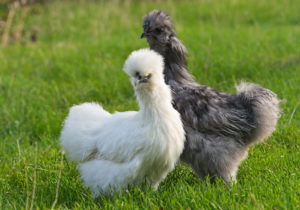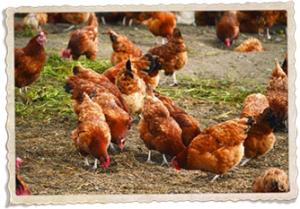The Silkie chicken stands apart from other chickens. It dates back to the Chinese Han Dynasty in 206BC, its name deriving from its unique black bones. In addition to its black bones, the Silkie also features black skin which is covered by a large amount of fluffy feathers. Silkies are one of the fluffiest chickens and have a unique “pom-pom” like head, dark set eyes, turquoise-blue earlobes, and an extra toe on each foot. These chickens are ideal for pet lovers who are looking for a furry companion, and make for a great addition to any backyard chicken coop.
Types of Silkies
There are several types of Silkies that include Partridge Silkies, Black Silkies, and Splash Silkies. The American Poultry Association currently lists blue, black, white, grey, buff, splash, and partridge as possible colors of Silkies. Several other colors include lavender, cuckoo, and red, but they have not been accepted by the APA to date.
Silkie Chicken Appearance
One reason for the Silkie’s popularity is all thanks to its distinctive appearance. Its fluffy feathers, pom-pom head, and five-toed feet all create a chicken that quite literally stands apart from the crowd.
Coat
Most people are interested in Silkies because of their fluffy appearance, which comes from their barbicel-lacking feathers. Barbicels are hooks that hold feathers together. Without this feature, Silkie chickens essentially have the under-down of a regular chicken as their main feathering. This type of feathering looks appealing, but it causes Silkies to have difficulty flying. In fact, they are typically unable to fly at all.
Size
Silkies come in a variety of sizes but are only considered bantam in the United States (most countries categorize Silkies as bantam or large fowl). Larger male Silkies weigh around 4lb (64oz), while females weigh 3lb (48oz). Smaller bantam male Silkies weigh around 600g (21oz), with female bantams weighing 500g (18oz).
One Extra Toe
As mentioned above, Silkies further distinguish themselves from other chickens by having five toes, compared to the traditional four. Furthermore, the two outer toes on each foot are typically feathered.
Mothers & Pets
Silkies are great mothers and brooders. In fact, even the male roosters are known for having maternal instincts. So, while Silkies do not lay a large number of eggs (typically 120 per year), they can help raise the eggs they lay into healthy and happy chicks. Their maternal nature also makes them a very gentle breed. Their docility is why many backyard chicken raisers use them as pets or show birds. They love sitting on laps and can often be seen talking to and following their owners around the backyard.
Health & Safety
Avoid Predators and Bullying
As most Silkies are unable to fly, they run the risk of being harmed by other chickens and animals either from above or at ground level. Additionally, their docile nature makes them easy targets for bullying. As such, we suggest you keep your Silkies in a protected, “safe” environment where they run less of a risk of being attacked.
Trim their feathers
Their fluffy feathers can grow around their eyes, so it’s important to give them a trim every so often for improved vision. Silkies also run the risk of getting sick when they get wet in colder temperatures. Although they can withstand colder temperatures, it is advised to dry off your Silkie as soon as you notice they are wet (either with a towel or blow dryer). A Silkies fluffiness can make them susceptible to mites and lice as well, so it is important to check them regularly for these.
The Perfect Backyard Chicken
Silkies make for the perfect backyard chicken. They become fluffy, lovable pets that the entire family will love. They will be a devoted companion for their entire life, and whether they are confined or free range, they will adapt to their environment and forage successfully. When properly cared for, Silkies typically live for 7-9 years.
If you’re looking to add a few Silkies to your backyard flock, then Chickens for Backyards can help. We offer many types of Silkie Chickens. Contact us today with any further questions!

